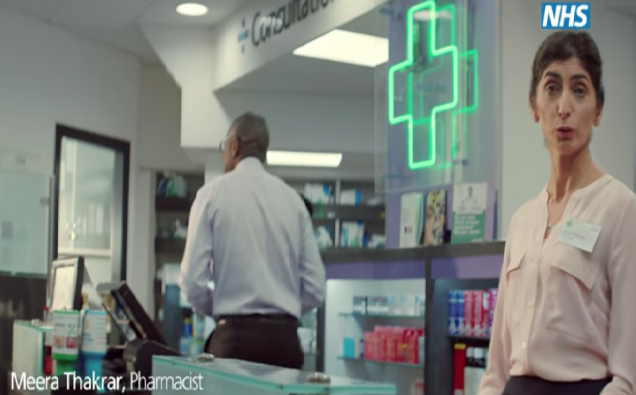· A major new public health campaign urges parents to consult a pharmacist first for minor illness, instead of GP or A&E
· 18 million GP appointments and 2.1 million visits to A&E for self-treatable conditions cost the NHS £850 million per year
· Using a pharmacy for minor health concerns eases pressures on GPs
Millions of parents could get more convenient and timely expert advice if their child has a minor illness by opting to go to their local pharmacist first instead of the GP.
Research for the NHS shows just 6% of mums and dads with children under the age of five would consider seeking help about a minor health concern from a high street pharmacist in the first instance. More than a third (35%) would opt for an appointment with their GP while 5% of those questioned would choose emergency care as their first point of call.
This is despite an overwhelming majority of adults (79%) saying they are aware that pharmacists are qualified healthcare professionals who can give advice on most common illnesses which includes when and where to seek advice for more serious conditions.
The NHS is urging more parents to use their pharmacy first in a move which could help free up GP time for sicker patients and help save the NHS around £850 million each year as well as save time for busy families.
Around 95% of people live within a 20 minute walk of a local community pharmacy, making pharmacists extremely accessible and a valuable first port of call for minor health concerns such as coughs, colds, tummy troubles or teething.
Around 18 million GP appointments and 2.1 million visits to A&E are for self-treatable conditions – such as coughs and tummy troubles – at a cost of more than £850 million each year to the NHS. This is the equivalent of more than 220,000 hip replacements or 880,000 cataract operations.
The NHS nationally is working with community pharmacies to increase the range of patient services they provide including asthma audits and flu vaccinations and to promote the clinical expertise available from the pharmacy team.
Dr Bruce Warner, Deputy Chief Pharmaceutical Officer for England said: “Pharmacists are highly trained NHS health professionals who are able to offer clinical advice and effective treatments for a wide range of minor health concerns right there and then. They can assess symptoms and recommend the best course of treatment or simply provide reassurance, for instance when a minor illness will get better on its own with a few days’ rest. However, if symptoms suggest it’s something more serious, they have the right clinical training to ensure people get the help they need. We want to help the public get the most effective use of these skilled clinicians who are available every day of the week.”
The call for people, in particular the five million parents of children under five, to use their local pharmacist first for advice is part of the Stay Well Pharmacy campaign. It is backed by pharmacists and Netmums, the UK’s biggest parenting website.
A survey carried out as part of the campaign reveals that the proportion of adults questioned who would get advice from the pharmacist for minor health concerns is only 16%. This went down to just 6% for parents of young children.
While 77% of people agree they trust advice from their pharmacist, there are misconceptions about the level of service this highly trained group of healthcare professionals can offer in terms of advice and expertise.
A quarter of people (26%) feel it is difficult to discuss health concerns in private with a pharmacist, with many not being aware that more than nine out of 10 pharmacies have a private consultation room. Nearly a quarter (24%) feel they would need to visit the GP anyway, so go direct to the doctor in the first instance. However, NHS England found that among adults who have received advice from a pharmacist in the past six months for themselves or their child, two thirds (66%) found it useful and less than a fifth (19%) needed to go to the GP afterwards.
Ruksana Rohim, a mum of one, said: “I regularly use my local pharmacy when my child has a minor illness like a cold or tooth ache and to help other family members manage their long term health conditions.
I have developed a really good relationship with my local pharmacy. It’s close to home and the team there are always so helpful. They are healthcare experts so the advice they give puts my mind at rest. The fact that I don’t need to book an appointment helps a great deal when I need quick, immediate advice for a minor health issue.”
Meera Ganatra, Community Pharmacist who features in the ‘Stay Well Pharmacy’ TV advert, adds: “We understand that it’s worrying when a young child is poorly, and for parents it can be particularly distressing. We urge the public to choose to visit their local pharmacy first for minor health concerns when they want to see a highly trained specialist who is qualified to assess symptoms and who is always available without an appointment to offer clinical advice and support. And if symptoms suggest it’s something more serious, we have the right clinical training to ensure people get any further help they need.” For more information search NHS.uk where you can also locate your local pharmacy services.






















